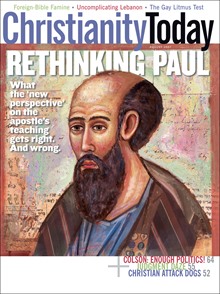Will the Real Paul Please Stand Up?
A review essay by pastor, scholar Tony Richie about the new perspective on Paul.

Simon Gathercole, “What Did Paul Really Mean?: ‘New perspective’ scholars argue that we need, well, a new perspective on justification by faith” Christianity Today (August 2007), pages 22-28.
Simon Gathercole is a NT scholar and former Senior Lecturer in New Testament at the University of Aberdeen, Scotland. In 2007, he joined the Faculty of Divinity at the University of Cambridge. Gathercole received his MA at Cambridge, and then completed a MATH and PhD under James Dunn, a renowned NT scholar himself, at the University of Durham. While Dunn is a founding proponent of the so-called “New Perspective on Paul,” Gathercole opposes it. Drawn from his dissertation, his book Where is Boasting? (2002), is a critique of NPP. In this succinct CT article, with a title probably playing on NPP advocate Tom Wright’s What Saint Paul Really Said (1997), Gathercole capably sums up the major issues at stake in the debate, and circumspectly presents his own view. He is appreciative of elements of NPP but ultimately rejects its fundamental thesis. Though at times technical (for those of us who are not NT scholars), as it touches on some of the most complex and important ideas in the NT and in Christian doctrine, especially the nature of justification and faith, this discussion will interest scholars and clergy alike, along with well-informed laity. I recommend it to readers of The Pneuma Review as an exceptional introduction/overview on a complex topic. It is probably not, however, fit fodder for the theologically faint of heart.
The CT editors do a good job of prefacing Gathercole’s article with some explanatory information that will help readers new to the discussion follow along. However, Gathercole himself is adept enough at putting NPP into perspective in the body of the article. One of the main aims of the editorial input is its framing of the debate in terms not confined to Reformed Christianity. Yet, as shown later this may be a debatable point itself. At its deepest level, this is a debate about the question: what is “truly biblical?” The author points out that NPP is not a new topic, but has been around for nearly 30 years (he does not mention antecedents around as early as 1900). It essentially argues that elements of the Protestant Reformation approach were “either wrong or ill-directed.” These concerns controversially include the doctrine of justification. Some Evangelicals, notably James D. G. Dunn and N. T. Wright, think NPP is “a key to unlocking Paul’s original intent.” Gathercole stresses that NPP is not really about Paul’s overall teaching; it is more narrowly about his doctrine of justification, in particular on justification by faith. It explicitly examines Paul’s understanding of works versus works of the law.
Gathercole argues that what the Bible says about justification is of paramount importance.
Category: Biblical Studies, Pneuma Review, Summer 2008


